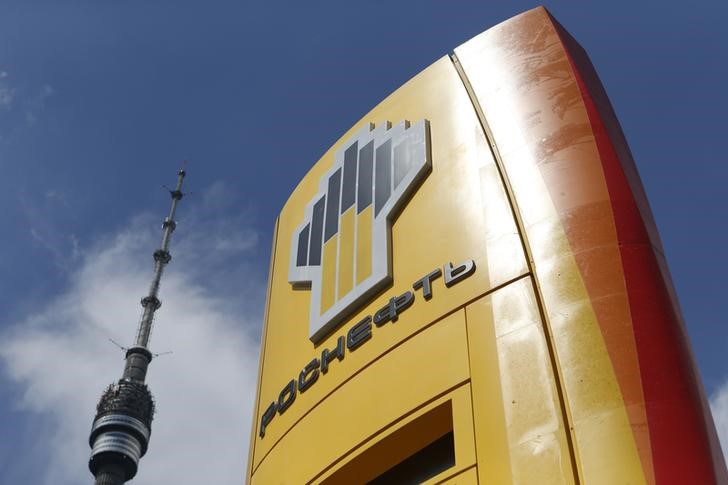By Gleb Gorodyankin and Dmitry Zhdannikov
LONDON (Reuters) - Rosneft (MM:ROSN) is raising money from Swiss trader Trafigura days before it must repay a $7 billion debt and squeezed by sanctions, industry sources said, seeking new options after a foray into the bond market fuelled a devaluation of the rouble.
The Kremlin-controlled firm's ability to raise debt has been severely reduced by sanctions imposed by Western powers which condemn Russia's annexation of Crimea and accuse it of orchestrating a rebellion in eastern Ukraine - a charge denied by Moscow.
The squeeze has been compounded by a collapse in oil prices and the rapid devaluation of the rouble - a crisis the central bank said Rosneft contributed to when it borrowed a large sum through the local bond market in the run-up to the repayment of another $7 billion loan to Western banks in December.
That added to pressure on the Russian currency due to fears the roubles might be used to buy dollars, the central bank governor said, though Rosneft has denied any link between its bond issue and rouble volatility.
Now the Feb. 13 deadline for the repayment of another $7 billion loan to banks is nearing, and Rosneft is exploring alternative options including short-term financing, according to trading and oil industry sources.
Sanctions ban long-term financing of Rosneft - a measure that has prompted all Western companies to pull out of any such deals with the oil major - but allow short-term financing for a period of up to 30 days.
Under an existing five-year financing agreement with Trafigura which began in mid-2013, Rosneft sells 150,000-200,000 tonnes of oil a month to the trader - a deal which is allowed to continue because it was struck before sanctions were imposed.
Now Rosneft has committed to sell around 500,000 tonnes of oil to the Swiss trading house in February to raise money to help repay its debt, three trading sources told Reuters.
It was unclear how much money the financing deal would involve, or how it would be structured.
The delivery of 500,000 tonnes of oil would represent an increase of 300,000-350,000 tonnes - worth about $150 million at current prices - on Rosneft's usual monthly allocation to Trafigura.
"It is clearly a new deal," said one trader, who does not work for Rosneft or Trafigura, but heard about the details of the agreement. He declined to be named because he works for a rival trading desk to Trafigura.
'MASSIVELY DISAPPOINTED'
As a result of the deal with Trafigura, other trading houses and companies - which have long-term deals and in some cases have already made a pre-payment to Rosneft for their volumes - will receive lower-than-expected volumes in February or not get crude on the days they expected it to arrive.
"Traders (at rivals) are massively disappointed," one of the buyers said.
Rosneft has pre-payment and long-term supply deals with Vitol, Glencore (L:GLEN), Shell (L:RDSa), Total (PA:TOTF), Eni (MI:ENI), BP (L:BP) and Trafigura itself.
Long-term deals usually define several months upfront how much oil each buyer is due to receive every month, and changing those volumes is a rather unusual move as it could force Rosneft's buyers to look elsewhere for supplies.
Igor Sechin, Rosneft's chief executive and a close ally of President Vladimir Putin, has said the company does not need to borrow money as it is able to service its debt from its own cash flows.
The oil major raised over 600 billion roubles ($9 billion) on the bond market in December, which central bank governor Elvira Nabiullina said added to pressure on the currency because the market was expecting the oil producer to buy dollars with it.
Days after issuing its bond, Rosneft said it would not use the funds raised to buy foreign currency.
On Dec. 16, the day after Rosneft's disclaimer, the central bank increased its benchmark interest rate by 650 basis points to 17 percent, citing the need to curb increased devaluation and inflationary risks. Hours later the rouble fell to an all-time low.
On Jan. 26, Rosneft raised 400 billion roubles in the domestic bond market, also saying it would not use the funds to buy foreign currency.
Rosneft's loan maturing in February is part of a larger $11.9 billion, two-year bridge loan that was signed in Feb. 2013 that backed Rosneft's acquisition of oil company TNK-BP.

Lenders included BNP Paribas, Bank of America Merrill Lynch, Bank of Tokyo Mitsubishi, Barclays Bank, Citigroup, Credit Agricole CIB, ING, Intesa Sanpaolo, JP Morgan, Mizuho Bank, Natixis, Societe Generale and UniCredit.